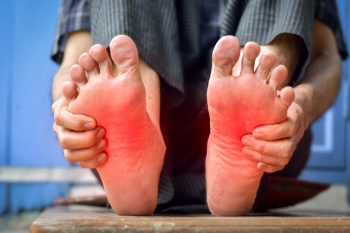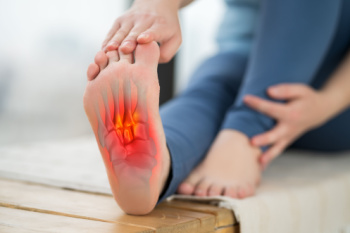Connect With Us
Blog
Items filtered by date: September 2024
Returning to Sports After Foot and Ankle Injuries

Acute foot and ankle injuries, such as sprains, fractures, or tendon tears, are common in sports and can range from mild to severe. These injuries typically occur due to sudden trauma, such as twisting the ankle or landing awkwardly. Recovery time varies depending on the severity of the injury. Mild sprains might heal within a few weeks, allowing a return to sports after about two to four weeks. More severe injuries, like fractures or torn ligaments, can take several months to fully heal, with recovery often extending to three to six months or more. Rest and gradual reintroduction to activity are important for preventing re-injury and regaining full strength and mobility. Rushing back too soon can lead to complications and prolonged recovery. If you have sustained a foot or ankle injury from sports, it is suggested that you schedule an appointment with a podiatrist for a diagnosis and treatment.
Ankle and foot injuries are common among athletes and in many sports. They can be caused by several problems and may be potentially serious. If you are feeling pain or think you were injured in a sporting event or when exercising, consult with Jeffrey Rosenblatt, DPM from New York. Our doctor will assess your condition and provide you with quality foot and ankle treatment.
Common Injuries
The most common injuries that occur in sporting activities include:
- Achilles Tendonitis
- Achilles Tendon Rupture
- Ankle Sprains
- Broken Foot
- Plantar Fasciitis
- Stress Fractures
- Turf Toe
Symptoms
Symptoms vary depending upon the injury and in some cases, there may be no symptoms at all. However, in most cases, some form of symptom is experienced. Pain, aching, burning, bruising, tenderness, tightness or stiffness, sensation loss, difficulty moving, and swelling are the most common symptoms.
Treatment
Just as symptoms vary depending upon the injury, so do treatment options. A common treatment method is known as the RICE method. This method involves rest, applying ice, compression and elevating the afflicted foot or ankle. If the injury appears to be more serious, surgery might be required, such as arthroscopic or reconstructive surgery. Lastly, rehabilitation or therapy might be needed to gain full functionality in the afflicted area. Any discomfort experienced by an athlete must be evaluated by a licensed, reputable medical professional.
If you have any questions, please feel free to contact our office located in Brooklyn, NY . We offer the newest diagnostic and treatment technologies for all your foot care needs.
Toenail Abnormalities

Toenail abnormalities can be a sign of underlying health issues or can result from trauma, infections, or improper nail care. Common problems include thickened nails, discoloration, ridges, and brittleness. Thickened nails might indicate a fungal infection or pressure from wearing ill-fitting shoes. Discoloration, such as yellowing or dark spots, can also signal a fungal infection, injury, or even more serious conditions like melanoma. Ridges, which can run either horizontally or vertically, may be a normal part of aging or a sign of nutritional deficiencies or trauma. Brittle nails, prone to cracking and splitting, can be caused by dehydration, overexposure to water, or a lack of vitamins. Paying attention to changes in your toenails and addressing them promptly with a podiatrist is strongly suggested.
Ingrown toenails may initially present themselves as a minor discomfort, but they may progress into an infection in the skin without proper treatment. For more information about ingrown toenails, contact Jeffrey Rosenblatt, DPM of New York. Our doctor can provide the care you need to keep you pain-free and on your feet.
Ingrown Toenails
Ingrown toenails are caused when the corner or side of a toenail grows into the soft flesh surrounding it. They often result in redness, swelling, pain, and in some cases, infection. This condition typically affects the big toe and may recur if it is not treated properly.
Causes
- Improper toenail trimming
- Genetics
- Improper shoe fitting
- Injury from pedicures or nail picking
- Abnormal gait
- Poor hygiene
You are more likely to develop an ingrown toenail if you are obese, have diabetes, arthritis, or have any fungal infection in your nails. Additionally, people who have foot or toe deformities are at a higher risk of developing an ingrown toenail.
Symptoms
Some symptoms of ingrown toenails are redness, swelling, and pain. In rare cases, there may be a yellowish drainage coming from the nail.
Treatment
Ignoring an ingrown toenail can have serious complications. Infections of the nail border can progress to a deeper soft-tissue infection, which can then turn into a bone infection. You should always speak with your podiatrist if you suspect you have an ingrown toenail, especially if you have diabetes or poor circulation.
If you have any questions, please feel free to contact our office located in Brooklyn, NY . We offer the newest diagnostic and treatment technologies for all your foot care needs.
Recognizing the Early Signs of Foot Arthritis

Early detection of foot arthritis can significantly impact treatment and management. Initial signs often include persistent joint pain, particularly in the toes or arches, which may worsen with activity. Swelling and tenderness around the affected joints are common, often accompanied by stiffness, especially in the morning or after periods of inactivity. As arthritis progresses, you may notice a reduced range of motion and difficulty in performing daily tasks, such as walking or climbing stairs. Changes in foot shape, like the formation of bunions or hammer toes, can also signal arthritis. Paying attention to these early symptoms and seeking medical advice promptly from a podiatrist can lead to effective management strategies. If you notice you have any of the above symptoms, it is suggested that you contact this type of doctor who can help you to manage this condition.
Arthritis can be a difficult condition to live with. If you are seeking treatment, contact Jeffrey Rosenblatt, DPM from New York. Our doctor can provide the care you need to keep you pain-free and on your feet.
Arthritic Foot Care
Arthritis is a term that is commonly used to describe joint pain. The condition itself can occur to anyone of any age, race, or gender, and there are over 100 types of it. Nevertheless, arthritis is more commonly found in women compared to men, and it is also more prevalent in those who are overweight. The causes of arthritis vary depending on which type of arthritis you have. Osteoarthritis for example, is often caused by injury, while rheumatoid arthritis is caused by a misdirected immune system.
Symptoms
- Swelling
- Pain
- Stiffness
- Decreased Range of Motion
Arthritic symptoms range in severity, and they may come and go. Some symptoms stay the same for several years but could potentially get worse with time. Severe cases of arthritis can prevent its sufferers from performing daily activities and make walking difficult.
Risk Factors
- Occupation – Occupations requiring repetitive knee movements have been linked to osteoarthritis
- Obesity – Excess weight can contribute to osteoarthritis development
- Infection – Microbial agents can infect the joints and trigger arthritis
- Joint Injuries – Damage to joints may lead to osteoarthritis
- Age – Risk increases with age
- Gender –Most types are more common in women
- Genetics – Arthritis can be hereditary
If you suspect your arthritis is affecting your feet, it is crucial that you see a podiatrist immediately. Your doctor will be able to address your specific case and help you decide which treatment method is best for you.
If you have any questions, please feel free to contact our office located in Brooklyn, NY . We offer the newest diagnostic and treatment technologies for all your foot care needs.
Causes and Prevention Tips for Foot Stress Fractures

A foot stress fracture is a small crack in a bone, typically resulting from repetitive force or overuse. This injury commonly occurs in athletes or individuals who suddenly increase their physical activity without adequate preparation. Factors contributing to stress fractures include wearing improper footwear, inadequate training techniques, and sudden changes in exercise intensity. Symptoms often involve localized pain that worsens with activity and improves with rest. To prevent foot stress fractures, it is essential to gradually increase activity levels, choose supportive footwear, and incorporate proper warm-up and stretching routines. Strengthening exercises for the foot and lower leg can also help build resilience. If you have sustained a foot stress fracture, it is suggested that you schedule an appointment with a podiatrist who can treat this condition.
Stress fractures occur when there is a tiny crack within a bone. To learn more, contact Jeffrey Rosenblatt, DPM from New York. Our doctor can provide the care you need to keep you pain free and on your feet.
How Are They Caused?
Stress fractures are the result of repetitive force being placed on the bone. Since the lower leg and feet often carry most of the body’s weight, stress fractures are likely to occur in these areas. If you rush into a new exercise, you are more likely to develop a stress fracture since you are starting too much, too soon. Pain resulting from stress fractures may go unnoticed at first, however it may start to worsen over time.
Risk Factors
- Gender – They are more commonly found in women compared to men.
- Foot Problems – People with unusual arches in their feet are more likely to develop stress fractures.
- Certain Sports – Dancers, gymnasts, tennis players, runners, and basketball players are more likely to develop stress fractures.
- Lack of Nutrients – A lack of vitamin D and calcium may weaken the bones and make you more prone to stress fractures
- Weak Bones – Osteoporosis can weaken the bones therefore resulting in stress fractures
Stress fractures do not always heal properly, so it is important that you seek help from a podiatrist if you suspect you may have one. Ignoring your stress fracture may cause it to worsen, and you may develop chronic pain as well as additional fractures.
If you have any questions, please feel free to contact our office located in Brooklyn, NY . We offer the newest diagnostic and treatment technologies for all your foot care needs.
We Can Treat Your Foot or Ankle Pain
Blog Archives
- April 2025
- March 2025
- February 2025
- January 2025
- December 2024
- November 2024
- October 2024
- September 2024
- August 2024
- July 2024
- June 2024
- May 2024
- April 2024
- March 2024
- February 2024
- January 2024
- December 2023
- November 2023
- October 2023
- September 2023
- August 2023
- July 2023
- June 2023
- May 2023
- April 2023
- March 2023
- February 2023
- January 2023
- December 2022
- November 2022
- October 2022
- September 2022
- August 2022

